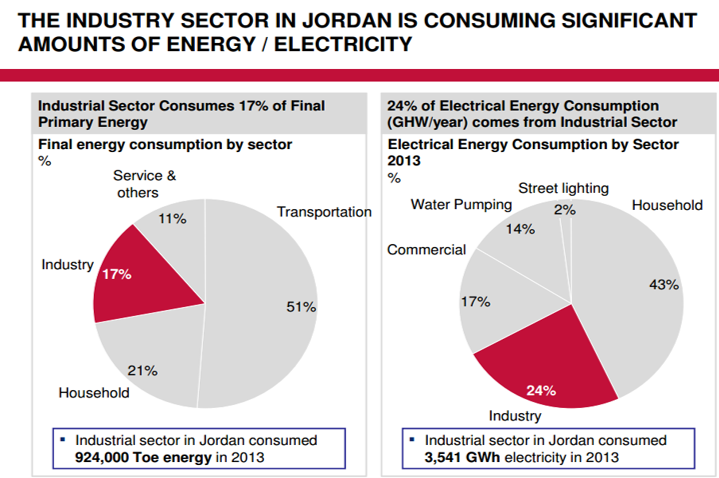- Client: World Bank/International Finance Corporation
- Implementation period: January, 2014 - December, 2014 (Completed)
- Geographic coverage: Jordan
- Theme: Energy, Environment
- Topic:
- Experts: Katarina Svatikova, Rob Williams
Promoting resource and energy efficiency through financial instruments – Jordan case study
The objective of the project (led by AMEC) was to develop an approach and toolkit on economic instruments that can promote industrial resource and energy efficiency in developing countries. The project consisted of two work streams: (1) a country analysis of the actual and potential incentives for resource and energy efficiency in Jordan, and (2) development of an approach and toolkit on the analysis and assessment of financial mechanisms for resource efficiency.
The country analysis (conducted by Trinomics) concluded that there is probably a large potential for energy efficiency in the manufacturing industry in Jordan, but several market barriers hinder its development. Nine existing financial instruments were identified as most relevant to future resource efficiency programmes and were further analysed in terms of their effectiveness, efficiency, success factors and bottlenecks.
A number of critical conditions for the instruments’ success were identified, such as the provision of tailored business support, the existence of clear and well defined criteria for giving financial support, low interest rates for loans, and reviewing the suitability of applicants before selection to give a grant/loan. In terms of factors which hindered implementation and uptake of financial mechanisms, the study concluded that full management by the Jordanian government does not seem to be the most effective/efficient governance structure, verification of the actual savings is a burdensome process, technical assistance which is not centralized is not effective, and programmes tailoring SMEs should have no or very low minimum loan.
Based on this analysis, the study also proposed a number of actions the national government could take over the short, medium and longer term to promote resource efficiency through financial instruments.

Key findings:
The country analysis (conducted by Trinomics) concluded that there is probably a large potential for energy efficiency in the manufacturing industry in Jordan, but several market barriers hinder its development. Nine existing financial instruments were identified as most relevant to future resource efficiency programmes and were further analysed in terms of their effectiveness, efficiency, success factors and bottlenecks.
A number of critical conditions for the instruments’ success were identified, such as:
- The provision of tailored business support
- The existence of clear and well defined criteria for giving financial support
- Low interest rates for loans, and
- Reviewing the suitability of applicants before selection to give a grant/loan.
In terms of factors which hindered implementation and uptake of financial mechanisms, the study concluded that full management by the Jordanian government does not seem to be the most effective/efficient governance structure, verification of the actual savings is a burdensome process, technical assistance which is not centralized is not effective, and programmes tailoring SMEs should have no or very low minimum loan.
Based on this analysis, the study also proposed a number of actions the national government could take over the short, medium and longer term to promote resource efficiency through financial instruments.